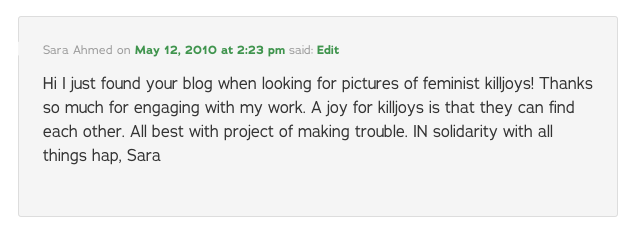This Saturday, May 12th 2012, is the third anniversary of this blog. Can you tell I’m a little excited? This blog has been such a great space for me to write and reflect and process ideas, theories, and experiences and I’m really proud of it. I don’t usually celebrate milestones (I didn’t go to either my masters or PhD graduations), but I’m enjoying taking the time and creating the virtual space to honor my accomplishment.
For the next three days, I’ll be looking back at some of the more memorable and popular posts from each of the three years that I’ve written in this blog. Today, I’m posting a list of the greatest hits (literally, the posts that got the highest number of hits/visits according to WordPress’ site stats) and some of my favorite posts from May 2009-April 2010.
Greatest Hits
1. GUEST POST by Kandace Creel Falcón. The Elf on the Shelf and other holiday panopticonisms/ December 22, 2009/ 8,575 hits
2. Little Miss Trouble / July 3, 2009/ 5,261 hits
3. Half-pint, the Troublemaker/ July 13, 2009/ 2,006 hits
4. Mike and Carol are the Worst Parents in the History of the World/ July 8, 2009/ 1,927 hits
5. Uh oh. Hannah Montana’s in (gender) Trouble/ June 20, 2009/ 1,672 hits
6. Does Troubling Virtue = Valuing Vice? And other questions about vice and virtue, part 1 /November 16, 2009/ 1,206 hits
Some Favorite Posts
1. A Fistful of Reasons, Part II: The Trouble with Bullies/ May 13, 2009
A favorite line, and perhaps one reason why I’m doing my Brady Bunch live-tweeting project:
Of course, the Brady Bunch is just a show from the 1970s. And, of course, the episode, “A Fistful of Reasons” must resolve the problem in 23 minutes. So, why should we look to it to address these issues of bullying? It seems to me that the Brady Bunch, for good or bad, does an effective job (sometimes frighteningly so) of reflecting and tapping into the values that many of us implicitly or explicitly live by. It does this in ways that don’t register to us as we sit passively in front of the television. Here is where troublemaking comes in again: Even as we watch and enjoy the glorious, retro-cheesiness that is the Brady Bunch, we should never stop thinking critically about the messages it is sending us or the guidance it is giving us.
2. The Book of Time outs, part II/ May 19, 2009
I’ve been wanting to write my own kids’ book for a while now.
When I think about a kid’s book on troublemaking, I imagine it as not always connecting troublemaking with bad behavior that needs to be punished. My kid’s book would not follow Lucke’s formula of bad behavior = well-deserved punishment = moral lesson. My kid’s book would invite children (and the adults who read to them) to think about how to distinguish between bad (harmful, selfish) and good (transformative, visionary) forms of troublemaking. Or maybe it would focus only on those examples of good troublemaking to demonstrate how many people throughout history have found ways to resist and transform the system. How they have learned to think for themselves and challenge rules that don’t work or are harmful. And, maybe it would argue that the most important result of their actions has not been a time out punishment, but the transformation of the world in ways that open up more possibilities to more people.
3. The Troublemaker as a feminist killjoy (or an unhappy queer)?/ December 18, 2009
A comment from the subject of the post, Sara Ahmed!
4. My 100th Post or the Winner of the Chewy Bagel Award for 2010/ March 18, 2010
This post is central to my linking Butler and Foucault with virtue, and it offers an origin story of the chewy bagel award!
What, you may ask, is the “chewy bagel award”? Many years ago my dad read my presentation on Judith Butler, radical democracy and identity politics that I wrote for the National Women’s Studies Association Conference. After finishing it, he remarked on how dense it was and what careful attention and concentration it demanded of the reader. On the top of the presentation he wrote, “Winner of the Chewy Bagel Award for 2004.” I think that this 100th post, which is all about Foucault, critique, Butler and virtue is worthy of the “Chewy Bagel Award for 2010″ for 2 reasons. First, this post is a chewy bagel because it is dense and requires that both the writer (me) and the reader (you) devote substantial time to thinking through the claims that Foucault, Butler and I are making about critique, disobedience, troublemaking and virtue. Second, this post is a chewy bagel because it is about promoting slow and careful rumination (chewing) on ideas, words, and claims. Here is what Butler says in “What is Critique: An Essay on Foucault’s Virtue” about the need for chewiness and how it enables us to patiently and persistently think and reflect:
“But here I would ask for your patience since it turns out that critique is a practice that requires a certain amount of patience in the same way that reading, according to Nietzsche, required that we act a bit more like cows than humans and learn the art of slow rumination” (307).
A dense, chewy bagel cannot easily be consumed. It requires effort to be eaten. A chewy bagel text is the same way. It is not meant to be easily understood or digested. It demands that we devote some serious time and effort to engaging and processing the ideas that it presents. I love the idea of cultivating patience and persistence; it resonates with one of my own visions of troublemaking, which I wrote about way back in May.
